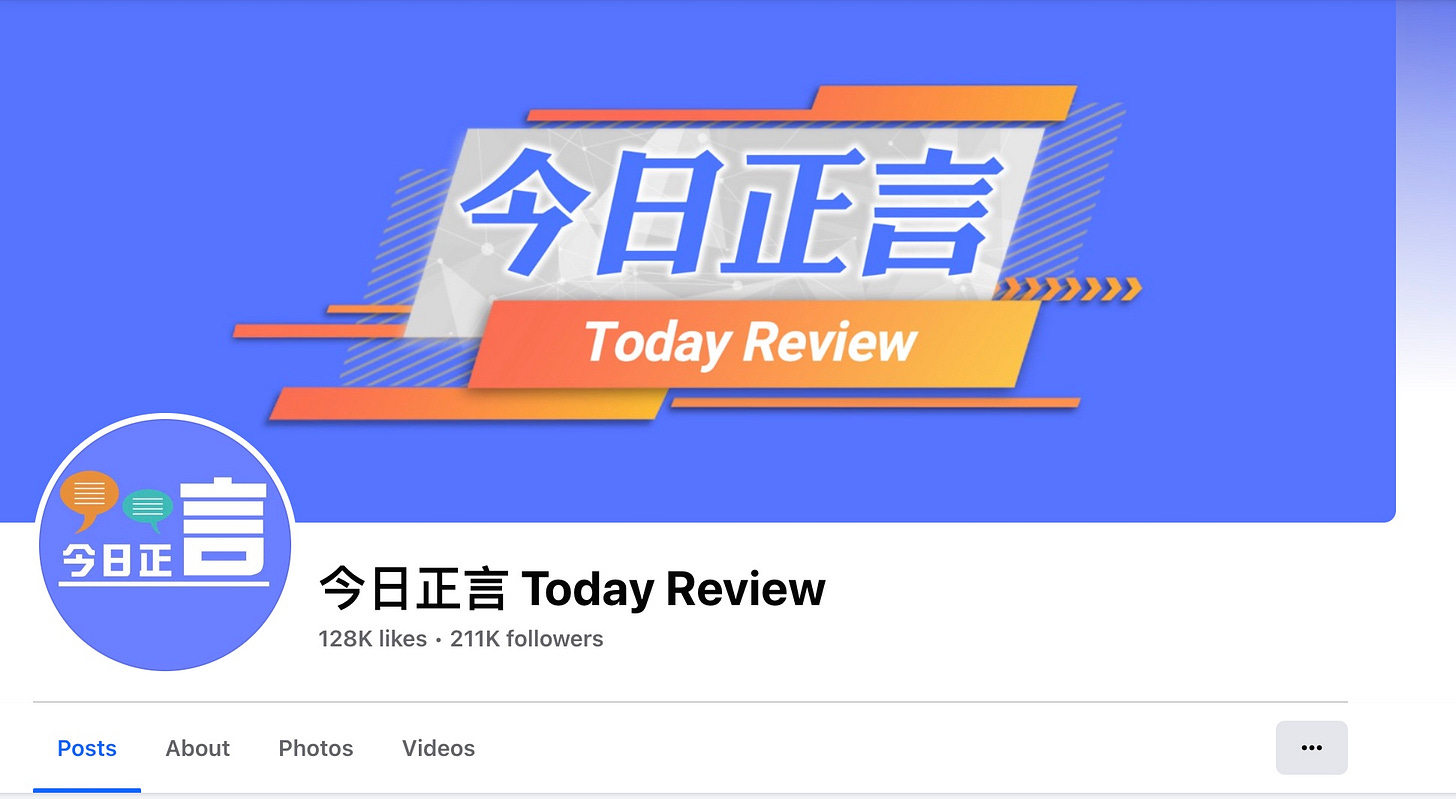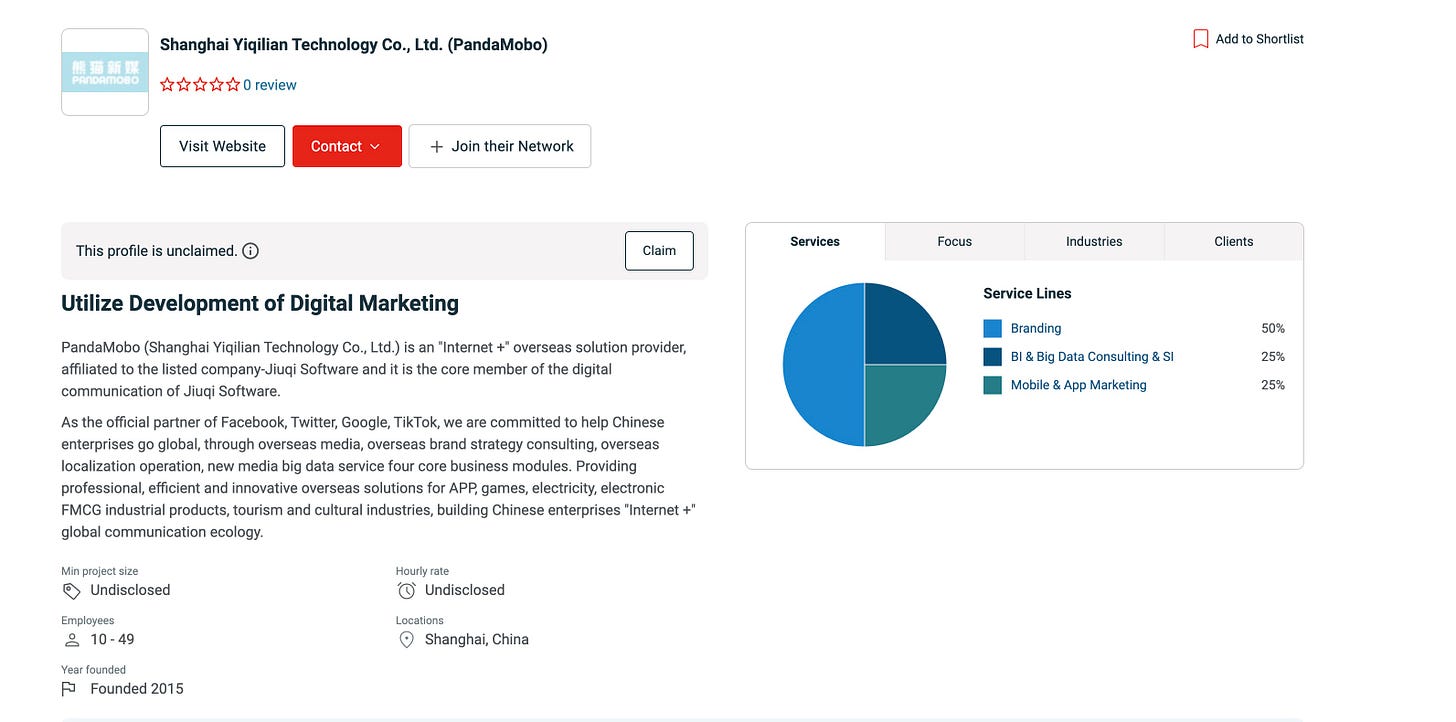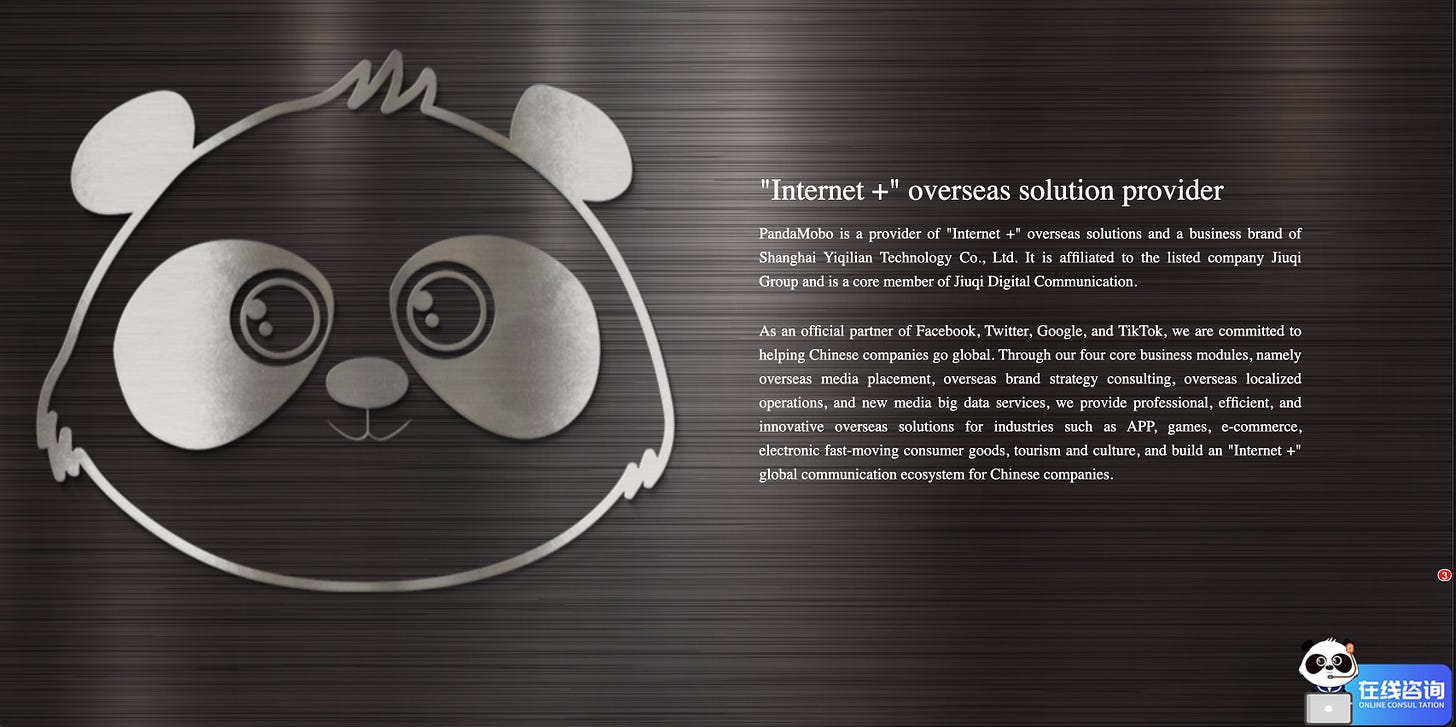PandaMobo: How Facebook Helps the People's Republic of China
PandaMobo is a marketing platform owned by Shanghai Yiqilian Technology Co., Ltd, which is part of Jiuqi Software, and a subsidiary of Beijing Join-Cheer Ltd.
Reader, do you know about the website reachtheworldonfacebook[dot]com? It’s a facebook website designed to get past China’s Great Firewall to attract Chinese businesses to advertise on Facebook. CNBC reported 8 years ago that Facebook planned to establish a base in Shanghai to tap into the Chinese market. So, how come our national security and intelligence experts on the SITE-TF seemed to have no idea answers when asked by reporters about the link between Facebook and the PRC?
Because of the lengthiness of the transcript from Monday’s briefing, I compiled into a PDF format for reader perusal. Some people might prefer to read the transcript rather than watch and listen to the video, so I provide readers with video transcripts.

The SITE-TF gave their weekly briefing on Monday.
Reader, basically they told us water is wet.
Like, thanks for sharing, Liberal government appointed task force that supposedly monitors election foreign interference. However, most people who pay attention and haven’t had their brains devoured by brain-worms already know the information you shared in your briefing SITE-TF.
Also, it’s great you monitor, several of us do. However, information tracking about election interference and transnational repression (TRA) does fcuk all without action to address the interference and intimidation. What’s the point of this? Is there a point to this? The Liberal government has a track record of performing, meaning it does things to say look, we did a thing everyone clap, and they take a cynical view of policy and actions to implement policy — all politics all the time. This treatment of foreign interference seems like more of that partisan politicking than anything designed to protect Canadians and our electoral system.
Reader, what do our security intelligence people know about foreign interference and strategic attack campaigns the PRC launches against Canada? It’s difficult to tell, however from where I sit, it seems they know very little. Is that intentional? Based on the track record of this Liberal regime, it would seem so. Reader, it would seem that the Liberal regime does not make an effort to deep dive into PRC foreign interference and TNR because it simply would rather not know. The Liberal Party has long developed a disconcerting comfort level with Chinese Communist Party influence in Canada.
Why? We can imagine or make educated guesses, reader.
What do we know about the ways the the Chinese Communist Party has embedded itself into Canadian society, its community infrastructure, its societal institutions, its media ecosystem? Not much.
Today I followed a lead and did a bit of digging and I’ll share with you what I found.
Reader, have you heard of Wumao, also known as the 50 Cent Army? The 50 Cent Army refers to Chinese mainlanders employed or contracted by the PRC government to post pro-PRC content on social media, and to attack online voices that oppose and criticise the PRC. The term comes from the idea that these online trolls receive 50 cents per comment they make. An estimated 500,000 to 2 million internet commentators belong to the 50 Cent Army, according to a 2019 publication by the McDonald Laurier Institute.
Reviewing leaked Chinese documents, Harvard University’s Gary King and colleagues found that “each [online post] was written by a specific, often identifiable, human being under direction from the government” (King, Pan, and Roberts 2017, 489). Given that the 50-cent party is estimated to be responsible for approximately 450 million annual postings online, the sheer scope of this endeavour is evident. — The Threat of Digital Foreign Interference, MLI
A 2018 report by a Taiwanese task force revealed that China uses online content farms to distort public opinion and sew discord amongst communities and individuals in Taiwanese society. The PRC deploys fake news aka disinformation campaigns to attack its ideological targets, these being any entity critical of or opposed to the CCP. China has long viewed the internet as a threat to the stability of the CCP’s hold on centralised power. Vivian Wu writes about the challenges of navigating Chinese media in the face of Xi Jingping’s growing push to tighten his controls on Chinese society and expand his controls on media and the press.
The landscape of Chinese diasporic media is shaped by a complex set of challenges, both tied to and independent of Chinese state influence … The CCP’s ‘external propaganda’ (大外宣) campaign has profoundly shaped the diasporic media landscape. Through acquisitions of overseas Chinese-language media outlets and strategic funding of local news outlets outside China, Beijing has extended its influence far beyond its borders (Maiko 2024). These state-backed entities operate as extensions of the CCP’s domestic propaganda machinery, disseminating narratives that glorify Chinese nationalism and reinforce the Party’s ideological control. —Vivian Wu, Made in China Journal, 8.4.2025
Wu mentions Sing Tao Daily (星岛日報), as having become CCP-aligned and tied to PRC state media such that the outlet now registers as a foreign agent under US Foreign Agents Registration Act. Reader, recall last week I mentioned that David Eby chose to speak to Sing Tao Daily on his 2023 trip to China? Think about a Canadian premier making such choice — naïveté or deliberate choice to embrace PRC state-controlled media, as a political leader from a country under foreign interference attack by the PRC? Reader, what do you think?
Wu writes about the challenges of independent Chinese media in the diaspora being a David battling the giant Goliath. Even audiences outside China often find themselves caught in a web of manipulated narratives, as CCP-funded outlets flood the space with state-approved content. As an aside, reader, does your mind wander off to the attacks on Ezra Levant and Rebel News by Canada’s regime media? After the sh1tfest at the Debates Commission this past week my mind went to Rosemary Barton and David Cochrane and the rest of the media elites denigrating and outright smearing independent journalists. What has happened to cause such a weird and disturbing dynamic in Canada’s news landscape?
Wu writes about the combined challenges of resource scarcity and the changing face of information consumption that incentivises shallow content at the expense of journalistic depth and integrity — i.e. click bait over investigative news. She also writes about the challenges of engaging with an audience that has grown accustomed to consuming sensationalistic regime narratives over critical news media. The growing popularity of algorithm-based media such as YouTube and X amplify the anemic narrative diversity and create a downward pressure on journalistic integrity—this incentivises rage baiting, engagement farming and other forms of emotionally charged news media content. As a result, the line between commentary, activism, and journalism becomes increasingly blurred, undermining the credibility of the entire diasporic media ecosystem, writes Wu.
Essentially, algorithms cultivate insularity, and insularity poses a challenge to journalists and media outlets. Reader, I can’t help but notice the parallels between the Chinese media and Canadian media. Insularity, sensationalism, low integrity, and high emotion, content geared toward manipulation rather than information, pro-state versus fourth estate approach to journalism — these challenges exist in both media ecosystems, which do overlap here in Canada. Did we bargain for these complexities when we dreamed of a multicultural society, reader?
How do we separate out state-driven media narratives from our media terrain?
How do we resist the emotionally charged media, both as journalists and consumers of information? It seems pretty clear that when a state funds the news media, it sets in motion a cascade of problems for that society. Last year China Digital Times reported on the TNR of an American-based Chinese dissident and his 16 year old daughter. On X, over 5,700 posts have singled out his daughter with lurid and threatening messages, and on Facebook doctored images appeared with the face of Deng’s daughter superimposed on scantily clad women, advertising sex for $300. At least one post called for her to be sexually assaulted, offering a bounty of $8,000.
China Digital News has added the term “weak spot” (软肋, ruǎn lèi) to its lexicon.
On Chinese social media, the phrase “weak spot” (软肋, ruǎn lèi) is often used metaphorically to refer to family members—particularly children—used as leverage by public security, state security, or government authorities to prevent individuals from speaking out, engaging in activism, or pursuing other activities that the authorities do not approve of. In the past, the tactic was mainly used by state security forces against higher-profile activists and dissidents in China, but in recent years, it seems to have filtered down to local public security bureaus, and is being used against people suspected of all manner of minor “transgressions,” including posting comments critical of local authorities on Chinese or overseas social media. It is also sometimes used as a tool of transnational repression, such as in the recent case of popular X (formerly Twitter) blogger Teacher Li is not your teacher, who lives in Italy but whose family has been threatened. — Cindy Carter, China Digital News, 3.5.2023
Reader there’s so much we don’t know, that we ought to know. It strikes me as intentional, this culture of ignorance in which we find ourselves.
Anyway. Moving on.
Reader, have you heard of Yiqilian?
Has Canada’s national security community heard of Yiqilian?

Yiqilian is a Chinese marketing company, an official Facebook partner, a private company that uses Facebook’s training and advertising resources to run government propaganda campaigns. Yiqilian owns the marketing platform called PandaMobo, one of a handful of China-based companies who can legally and directly advertise on Facebook, ie without a VPN. Facebook has a website that gets past China’s Great Firewall, for the purposes of recruiting advertisers and connecting businesses to marketing agents to assist in running publicity campaigns.
Yiqilian is a founding member of Facebook’s “ad-reseller” program, its way of accessing the Chinese advertiser market. Yiqilian’s partnership with governmental clients is not only not discouraged, but is actively touted by Facebook, which relies on direct and indirect Chinese government funds for a significant portion of its advertising revenue. — Maggie Baughman, ChinaTalk

Reader, Yiqilian represents a shift from the state-operated 50 Cent Army, and this seems like something SITE-TF et al should have tracked.
Yiqilian resells Facebook tools to government clients, with Facebook’s express knowledge and encouragement, signaling that the Chinese government can access precise population targeting tools and extensive engagement statistics.
Yiqilian, like other “official Facebook partners,” could provide Chinese government units with the types of targeting and messaging tools that Cambridge Analytica and the Russian government used to fuel misinformation on the very same platform. — Maggie Baughman, ChinaTalk
So, reader, what does this all mean? Where does it lead to? Given today’s SITE-TF briefing on the targeting of Joe Tay and others via a PRC-linked Facebook account, this Yiqilian-PandaMobo entity seems significant, something we ought to dig into and learn about in more depth.
During the SITE-TF presser Jim Bronskill from the Canadian Press asked the following question: Good morning. You mentioned a possible tie through Facebook to the Chinese government in the operation that you've explained today. Could you elaborate on that and to what degree is this repression operation you've identified the work of Beijing? The task force gave a reply to Bronskill that didn’t address the question he asked about how the PRC uses Facebook.
Christopher Nardi from the National Post reiterated Bronskill’s question about the connection between PRC and this Facebook account engaging in TNR: Facebook especially is not China-based, but the one account that you link to the PRC is on Facebook. So what has been happening in the case of Facebook? Why is a meta account so ... actively, seemingly engaged with the PRC to commit transnational repression. Do you know? Again, the task force didn’t have an answer to the question, other than to reiterate that they found several apparently PRC-linked accounts on Facebook engaging in TNR and election interference.
Reader, Maggie Baughman wrote the article describing her research in November of 2021. That’s four years ago, just after the 44th general election, in which the Conservative Party of Canada reported widespread election interference from the PRC. Recall that SITE-TF did not take the concerns seriously. Why don’t we know about that stuff she uncovered? At this point, it seems like willful blindness, reader.
Reader, four years ago a data analysis who specialises in Chinese propaganda and misinformation wrote about a China-based marketing company that has special access to Facebook and uses Facebook tools and resources to operate PRC government propaganda campaigns. That seems pretty important, shouldn’t someone in Canada be looking into that connection?
Fun Fact: According to John Kennedy, former Canadian ambassador to China (2002 to 2015) and confirmed by multiple sources, including Amnesty International, Vice, Wikipedia, Chinese internet slang refers to the CCP surveillance machinery (secret police and Ministry of State Security) as Guabao, short for Guojia Bao" (国家保), which translates to national treasure and is referred to as Panda.
So, to recap, PandaMobo is a marketing platform owned by Shanghai Yiqilian Technology Co., Ltd, which is a subsidiary of Beijing Join-Cheer Ltd.





